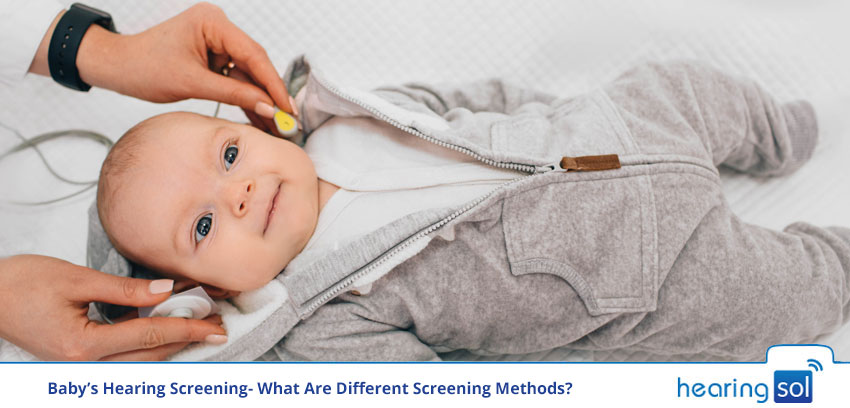
Most babies are born with perfect hearing. But about 1 to 3 per 1000 newborns are born with hearing loss. A hearing test can be done at any age but most of the babies have a Baby Hearing Screening test before they leave the hospital.
Children rely on hearing to learn things from the very beginning. If the hearing loss in newborns is not tested and treated, he/she can suffer from language delays, reading difficulty, and trouble with social skills.
- What Is Newborn Hearing Screening?
- How To Know If A Baby Has A Hearing Problem?
- Why Hearing Screening Of Newborns Is Recommended?
- When Is The Newborn Hearing Screening Is Done?
- Screening Methods
- Hearing Screenings vs Hearing Tests
- What If A Baby Does Not Pass A Hearing Screening Test?
- Treatment And Prevention Tips
- Summary
You can purchase the latest hearing aids at a fair price through HearingSol, If you need any assistance or you have a query regarding Baby’s Hearing ScreeningHearing Loss, feel free to call us at +91-9327901950. We are always here to help you.
What Is Newborn Hearing Screening?
It is a painless test done to your baby to check his or her hearing. Many hospitals provide a hearing screening after the birth of a baby, before discharging.
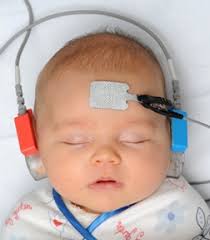
If your baby is born in a center that does not participate in infant hearing screening, they will refer you to a certified program to schedule your baby’s hearing screening.
Causes of Hearing loss in infants:
- The family history of hearing loss
- Low birth weight
- Genetic Disorders
- the problem in the structure of the inner ear
- Infections after birth
- Tumors
- Exposure to certain medicines or toxic chemicals while in the womb or after birth
- Infections passed from mother to her baby in the womb
- Infections such as meningitis or measles can damage the brain after birth
How To Know If A Baby Has A Hearing Problem?
Most hospitals screen a newborn’s hearing before sending him/her to home. But if your baby wasn’t screened in the hospital, you can consult a doctor about checking his hearing as soon as possible – within the first month.
Parents and people close to the child are the first to notice when a baby’s not hearing well.
Here is the checklist for detecting a hearing problem in a child-
- Doesn’t respond to a sudden loud sound.
- It doesn’t move or wake up by nearby noises and the sound of voices when sleeping in a quiet room.
- Doesn’t say a single word by the 12 months.
- Isn’t soothed by soft sounds.
- Do not turn to a source of sound (by 6 months).
- At about 6 months, he turns towards a softer sound.
- When a child is about 4 to 5 months old, he’ll look towards a loud sound.
Why Hearing Screening Of Newborns Is Recommended?
Hearing Screening of newborns is recommended to help in early detection and management. Treatment of hearing problems can be medical, surgical, or involves devices such as hearing aids, cochlear implants, bone-anchored hearing aids, or other assistive devices.
There are various screening programs which generally aim to-
- Screen newborns by 1 month of age.
- Confirm diagnosis by 3 months.
- Implement treatment by 6 months, if required.
When Is The Newborn Hearing Screening Is Done?
You may be offered a hearing screening of your child before discharged from the hospital. If not conducted in the hospital, you can contact a health professional, healthcare assistant, or health visitor within the first few weeks for screening.
This test can be done at up to 3 months of age but ideally, the test should be done in the first 4 to 5 weeks.
Screening Methods
Different methods can be used to decide which infants should be referred for complete diagnostic audiological evaluation. Physiological screening may not be feasible in all circumstances, although it is the most accurate process.
1. Family Questionnaires
Parents and the people close to the child may be asked about the response of their infants to sound and their use of language.
2. Behavioral Measures
The responses of babies to behavioral measuring devices such as noisemakers and other sophisticated audiological equipment are also used to identify hearing loss.
3. Physiological Measures
You must be worried about which auditory test is appropriate for infants? There are two types of safest and comfortable hearing screening tests to examine hearing in babies.
Babies are first screened with the Otoacoustic Emissions Test (OAEs). If they do not pass this test then the Auditory Brainstem Response (ABR) Test is performed.
Those newborns who spend more than five days in the Neonatal Intensive Care Unit (NICU) should receive the ABR test.
A) Otoacoustic Emissions Test (OAEs)
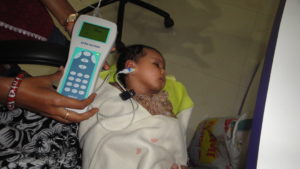
A small earphone or microphone is placed in the ear. Sounds are played in-ear and responses are measured. There is no need to say or do anything in the procedure. Results can be seen on a monitor screen.
- If the hearing is normal, OAE is produced.
- If a baby has a hearing loss, no echo or a reduced echo can be measured on the OAE test.
B) Auditory Brainstem Response Test (ABR)
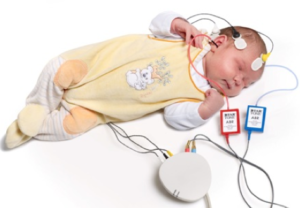
This test tells us how the inner ear, called the cochlea, and the brain pathways for hearing are working. Band-Like headphones are placed on the baby’s head and connected to the computer.
They record brain wave activity of the response to sounds presented to your ear through the earphones.
The electrodes placed on the baby’s head pick up responses from the hearing nerve and a computer measures the responses to identify a baby with hearing loss.
A two-tier test is conducted if OAE is not passed. Following is the procedure of Hearing Screening test if OAE is not passed (by the American Speech-Language-Hearing Association.)
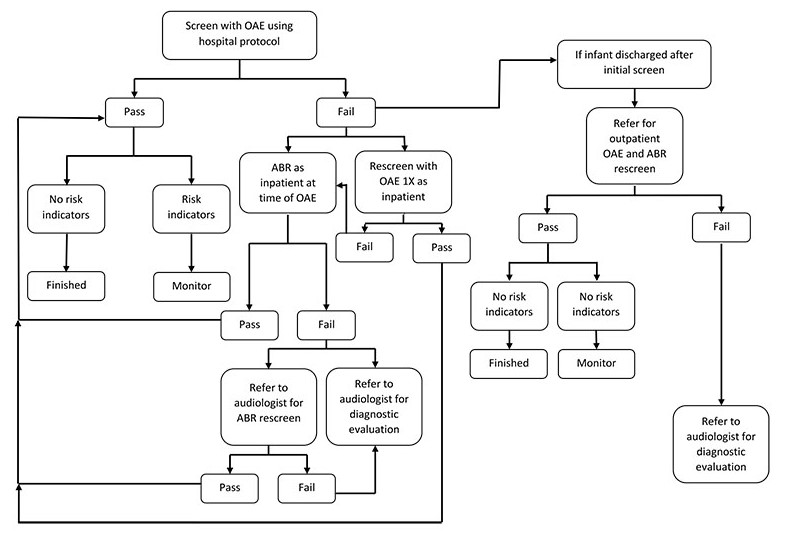
Hearing Screenings vs Hearing Tests
Hearing screening is simple evaluation of your ability to hear. This test is done to see if more in-depth testing needs to be done. Hearing Screening is conducted by hearing professionals.
Tools that are used in hearing screenings can be a tablet with headphones to a portable audiometer or even a questionnaire.
If hearing screening is passed, no further testing is necessary and it is assumed that hearing is normal. But if screening is failed, then further hearing tests by a qualified audiologist is necessary.
A hearing test is a more comprehensive assessment of hearing. Different types of tests are used to determine the ability to hear the sound.
These tests are painless so no need to be anxious or worried about the procedure. Hearing tests can also tell the functioning of components of the ear responsible for hearing.
Different types of tests used in the baby’s hearing test are Speech testing, Tympanometry, Acoustic reflex.
What If A Baby Does Not Pass A Hearing Screening Test?
If a baby does not pass the hearing screening, it does not necessarily mean that the baby has a hearing loss. In Fact, there are many babies who do not pass the screening test but their hearing is normal.
In case if they don’t pass the test, they are referred for further testing within the first month after birth. Some may refer you to a pediatric audiologist for rescreening and more comprehensive hearing testing.
It’s important that you respond quickly so that your baby will not miss out on skills of successful listening, talking, pre-reading skills, and early brain development.
If A Child Passes A Hearing Test, Is There Still A Chance Of Developing Hearing Loss?
Some babies are born with risk factors that may cause a hearing loss later in childhood or even adulthood. Hearing loss can also be acquired because of illness, infection, or injury.
If you observe that your child has difficulty in hearing and developing speech and language skills, you should go for his/her hearing tested by an audiologist skilled in a pediatric evaluation.
Rescreening
Even if your child passed the newborn hearing screening, you should keep observing him for if he acquires any symptoms later. You should go for rescreening if your child has the following signs and symptoms-
- If they were born prematurely and or have additional medical needs.
- If they have allergies and illness which can affect hearing.
- Not meeting milestones of speech and language for their age.
- Frequent ear infection.
- Don’t respond to soft sounds.
- Speech is difficult to understand.
Treatment And Prevention Tips
Treatments
Treatment of a newborn with hearing loss is essential as it will help in his/her overall development. It may start as early as a baby is 6 months old.
Treatments may include:
- Medicines
- Surgery
- Ear tubes
- Hearing Aid
- Cochlear Implant
Prevent Your Child From Hearing Loss
Prevention is better than cure. Hearing plays an important role in communication, language development, speech, and learning.
So, you should take care of the following things to prevent your child from hearing loss-
Have a healthy lifestyle during pregnancy.
- Routine prenatal care.
- Ensure that your child gets all childhood vaccines.
- Keep your child away from loud noises.
- Maintain your baby’s cold and ear infections.
Summary
Newborn hearing screening is to help in detecting hearing loss as soon as possible. The sooner a child with a hearing problem is diagnosed and gets treated with language training, hearing aids, cochlear implants, or other treatment, the more likely he is to meet developmental speech and language milestones.
Experts say that the best time for children with hearing loss to receive help is before they’re 6 months old. However, there are some cases where a baby passes a hearing test and still, have hearing loss.
So, even if your child has passed the infant hearing test, it important to keep eye on him and observe the signs of hearing loss, so that early treatment is possible.
You can purchase the latest hearing aids at a fair price through HearingSol, If you need any assistance or you have a query regarding Baby’s Hearing Screening or Hearing Loss, feel free to call us at +91-9327901950. We are always here to help you.

 Reviewed by Mr. Ranjeet Kumar
Sr. Audiologist, Speech Therapist & Cochlear Implant Specialist, BASLP on
Reviewed by Mr. Ranjeet Kumar
Sr. Audiologist, Speech Therapist & Cochlear Implant Specialist, BASLP on